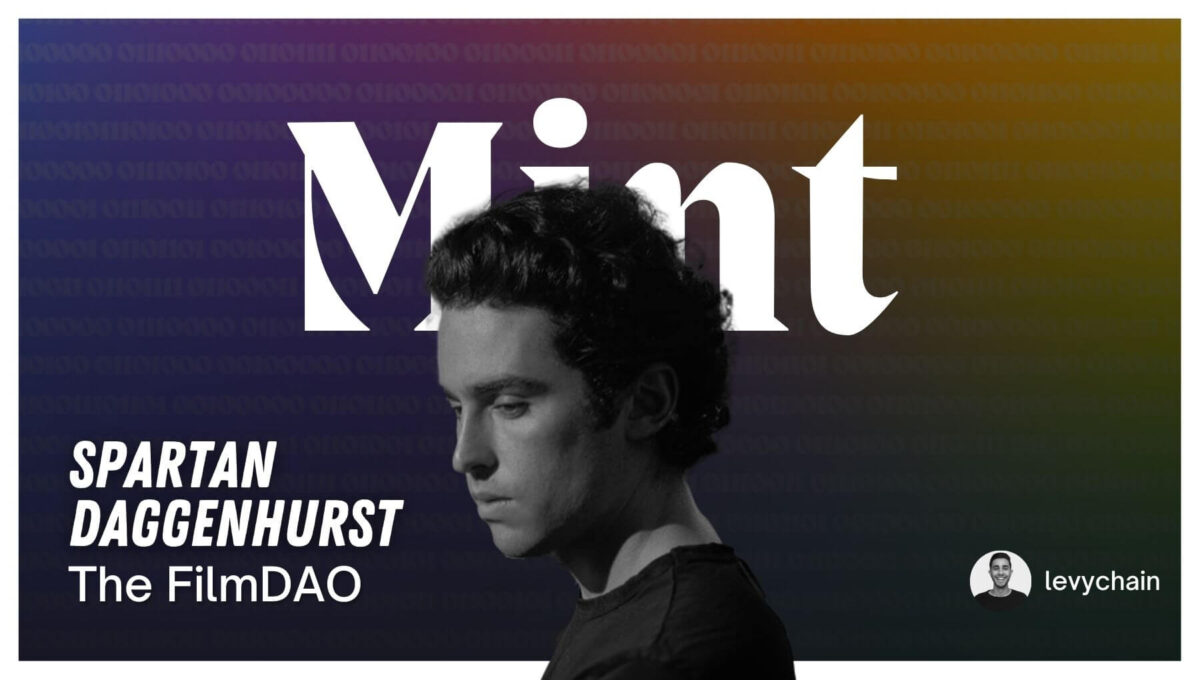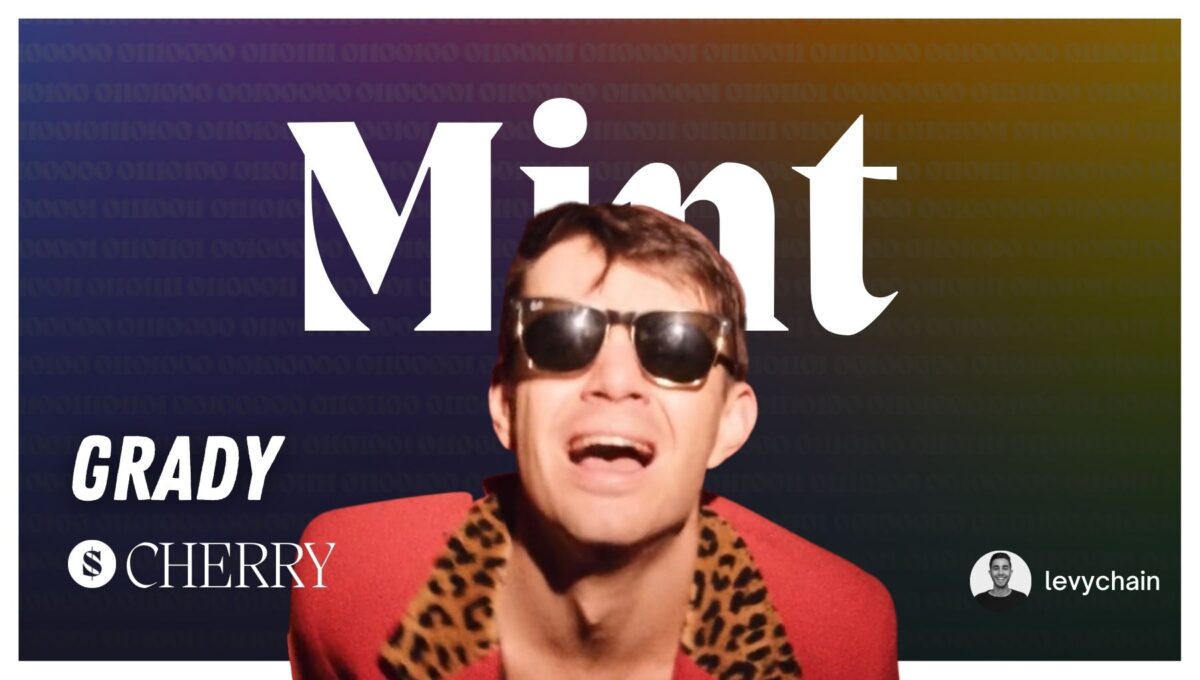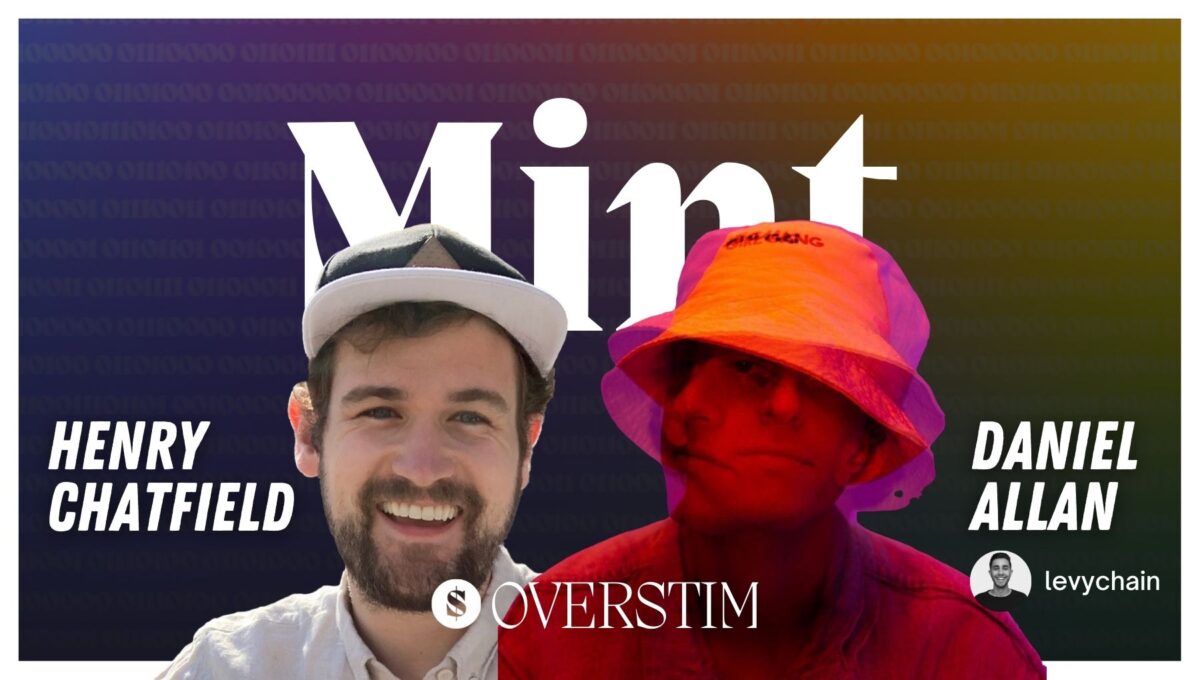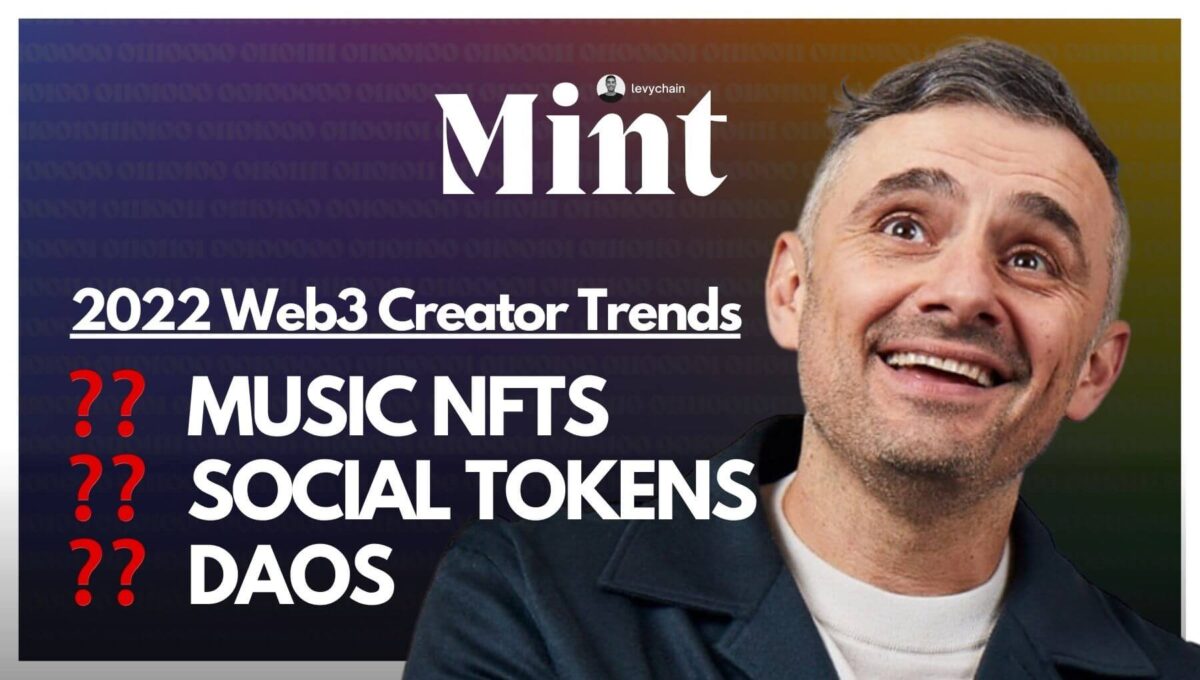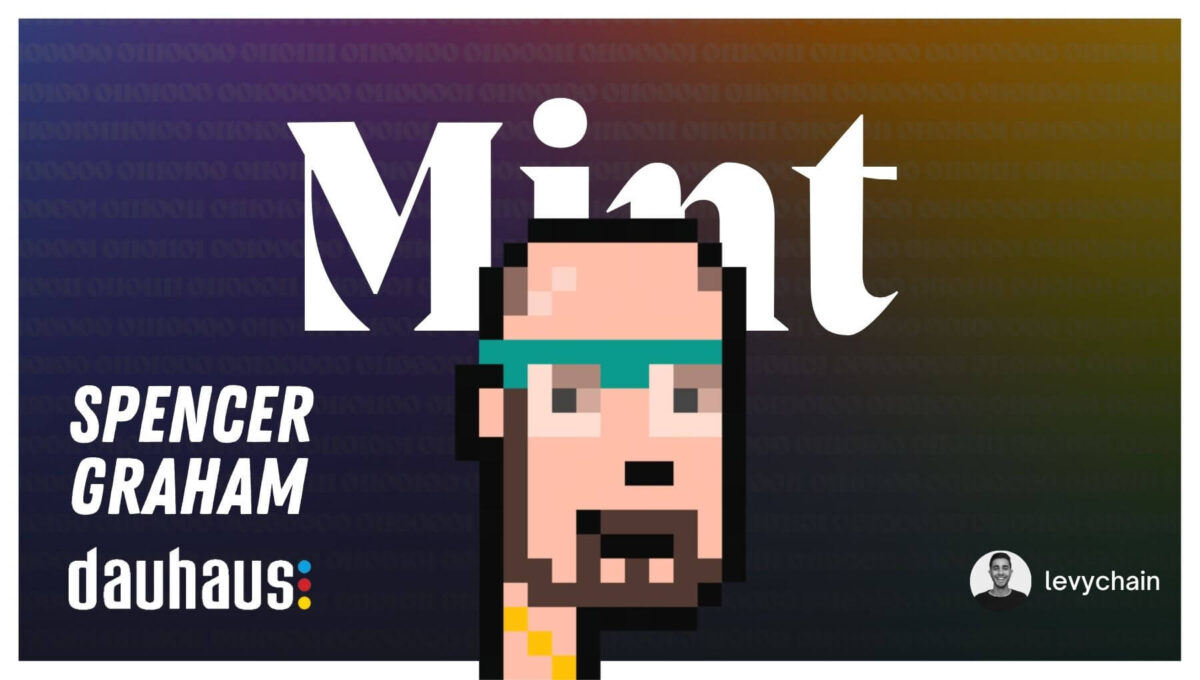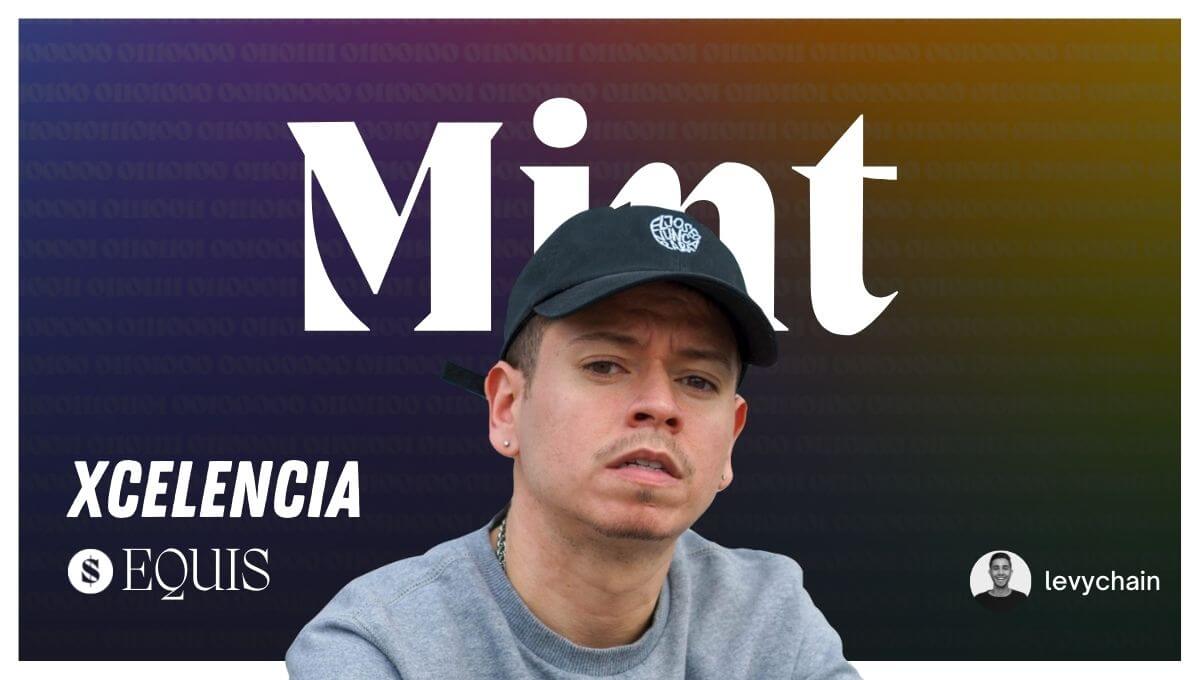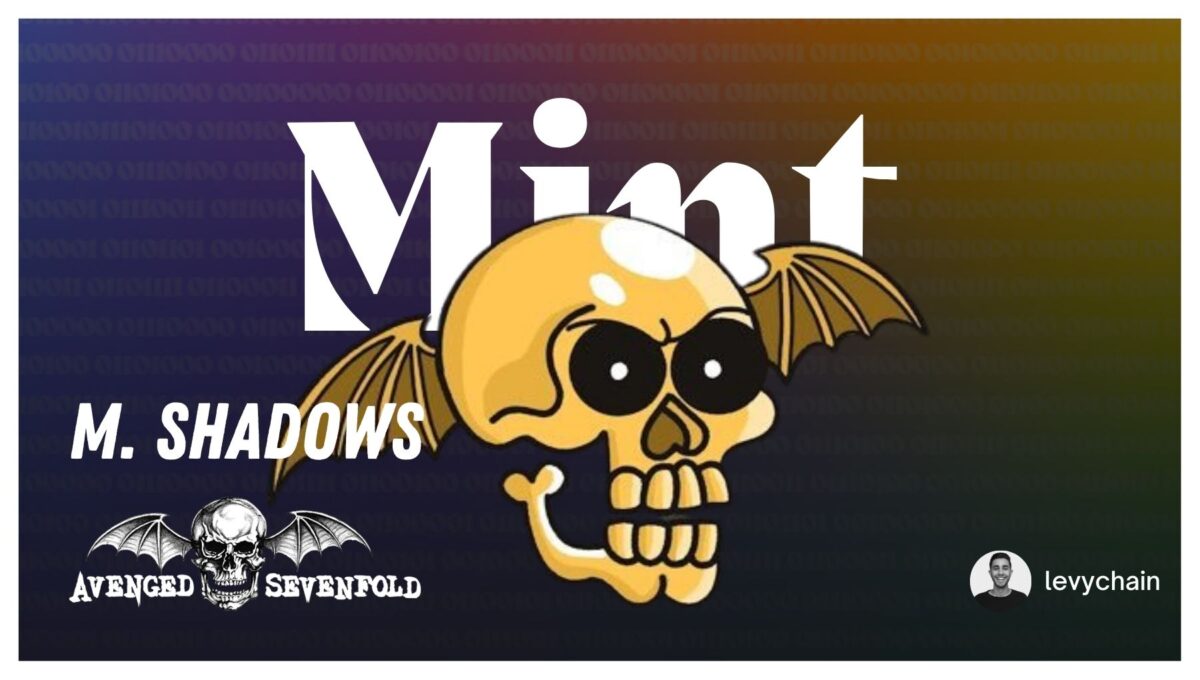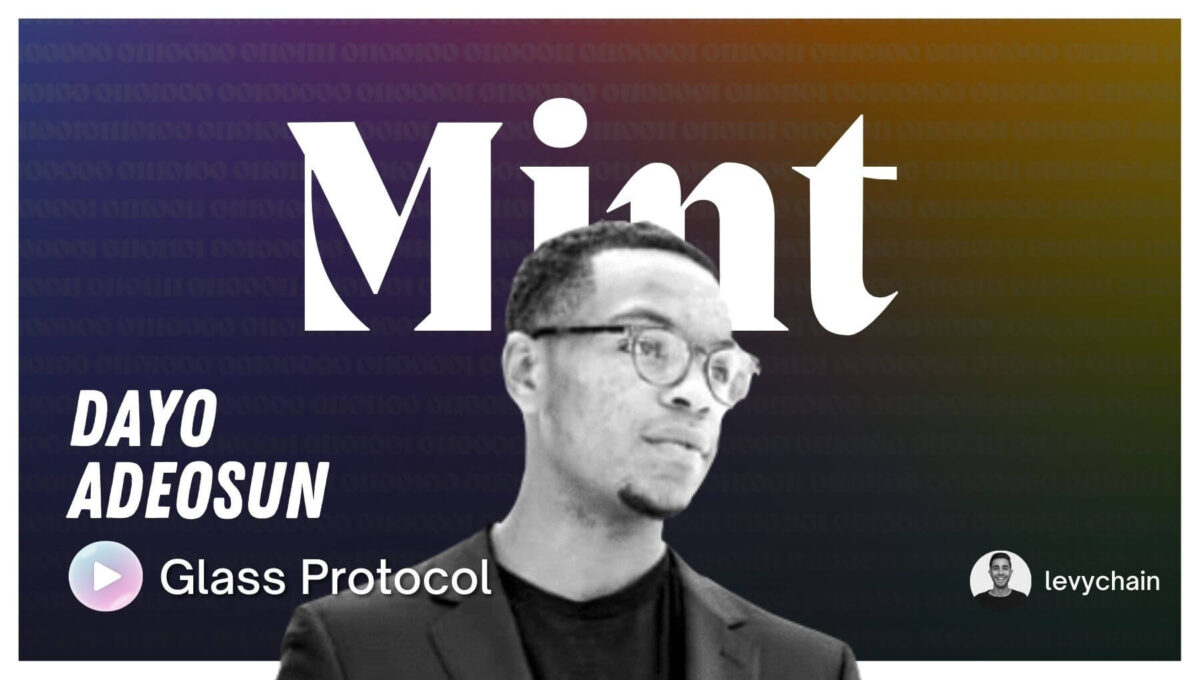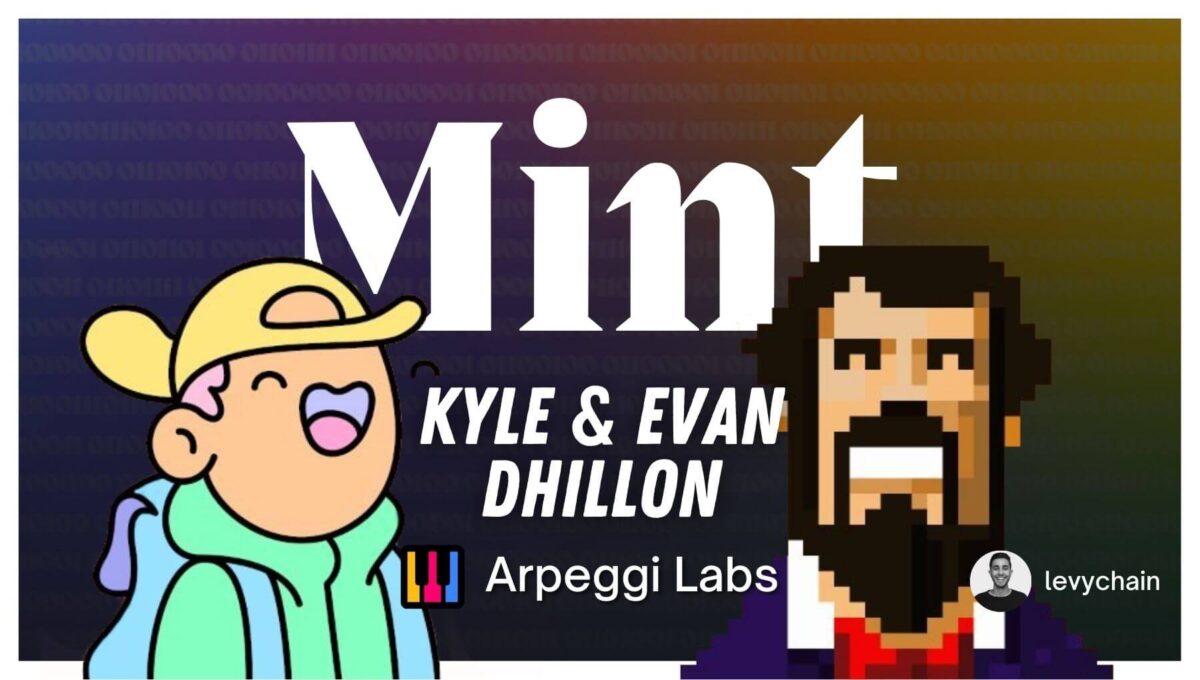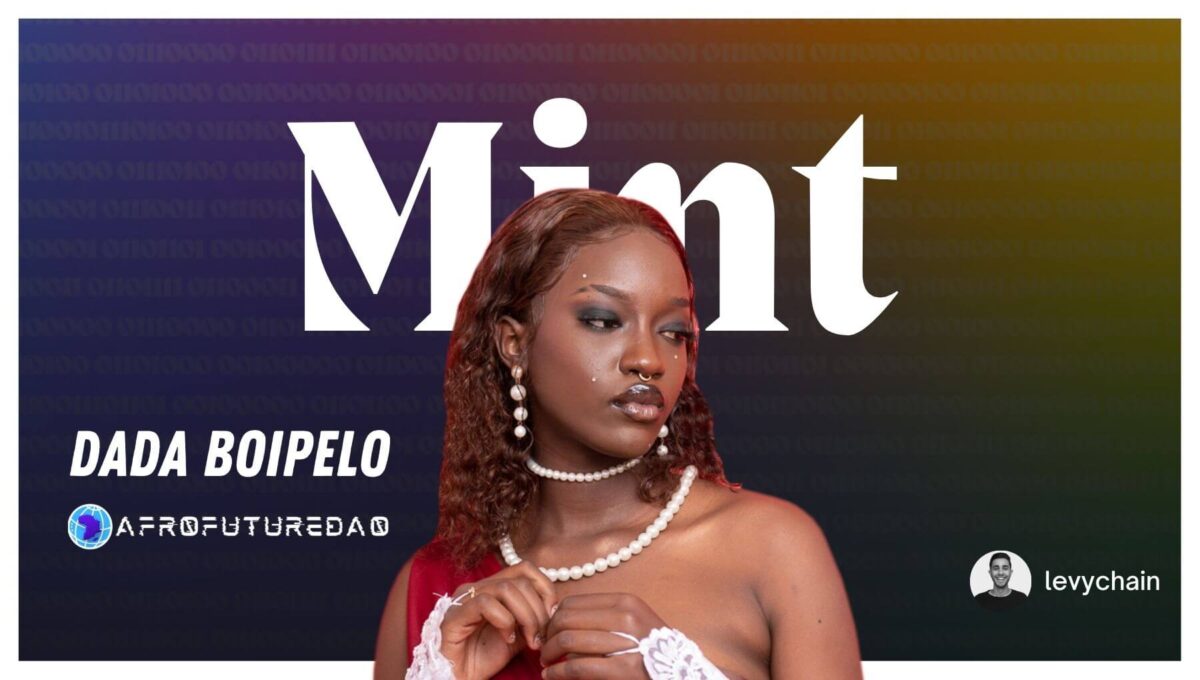Listen on: Spotify | Apple Music | Google Podcast
Background
- 00:27 – Intro
- 09:02 – What is The FilmDAO?
- 15:25 – Importance of Community in the Film Industry
- 22:46 – How Crypto can help Hollywood
- 31:38 – NFTs being used in Hollywood
- 37:02 – Using NFTs as a vehicle for Crowdfunding Films
- 40:51 – When will movie funding have its way in Web3?
- 47:32 – Outro
Support Season 4’s NFT sponsors!
Spartan. Welcome to Mint. Thank you for being on how are you doing?
Thank you, Adam. Happy to be here very well. How are you?
Intro
Good. I’m good man. Living the dream. I’m excited for you to be on you’re the first movie film project that I’ve come across in web three and got super excited about at the time it was called a different name, but now it’s called The Film DAO. Before, before we jump into everything. Okay. Who are you, what does the world need to know about you and how did you get your start in crypto?
In crypto? Okay. I was buying Ethereum and Bitcoin, from years ago and that was kinda the extent of my forays into crypto. And then last year through our mutual friend Cooper, I started, entering into the NFT space , I was just buying into projects. I was finding projects that I thought were cool and buying into them, but that’s basically it. I was a collector and that was the extent of my experience in web three. Besides that I went to Bard for classical piano and music composition. I was composing operas, for a long time after school. And I was trying to do these animated operas, kind of like Fantasia, but a little bit more adult themed. And I was kind of finding that there wasn’t a market for any of that. And I was kind of just like pounding away in my closet, working, working, drawing these stick figures, to animators and scoring the music to that. And after a few years of that, I thought, okay, well, at this point I’m just making movies. So I should move into film because I was thinking, you know, opera composers back in the day would probably be making movies if they had the technology today. So that’s how I got into film.
So what year was your first crypto purchase?
2016 or 17 probably.
Wow. What did you purchase, do you remember and where?
Definitely Ethereum. I remember specifically and I’m making an exception because I do remember in 2013 or 2014, you know, some of my friends in my college dorm were like, oh, you gotta buy this thing. It’s called Bitcoin it’s 300 bucks a pop. I was like, ah, I don’t know. I think I bought one and then sold it when it, when it doubled.
So actually your love for crypto and your love for film, how did those two worlds collide? Like what’s the story behind that?
So it’s really interesting. The two world’s collided last year because I was in the process of funding, a big first feature that I’ve been working on for a year and a half. I’ve had the script, we have a full animat storyboard. We have actors, cast, we have locations. And then the same thing with most projects, but specifically with film, the funding becomes an issue. So we had some commitments, we had cash in the bank, but not the entire budget. And when you’re not doing, there’s something called pre-sales. So when you have someone like, let’s say Brad Pitt, you don’t actually have to have the money for the movie because, if you have a commitment from them, you can go to all the territories worldwide for distribution and get guarantees. Like I will give you X million dollars for the rights to stream this or to distribute this in theaters in my territory because I know that people will come to see Brad Pitt. So since we weren’t doing it that way, we had to have all the money in equity. And I was sitting there, I had a few dead fellows. I had some other projects that I was in and I realized because this story takes place on a fantastical, fake Mediterranean Island in the 1960s called Sangas Barre, which is like a bit, the germinating idea for that was, to do a movie about cat burglars. That’s what the theme is on a island that’s a bit French, Greek, Italian, Spanish, like a Malta that never was. So it’s this kind of weird setting that lends itself very well to creation. And so I was sitting there with Cooper and I was thinking, man, I haven’t had this storyboard artist doing these storyboards for the movie. I can send you some later for a year, drawing every scene with me. It’s a method that we use in filmmaking to know what you’re doing before you get to the set. And I was like, well, why don’t we just do 10,000 citizens of this fake island and immediately, it just clicked. And that’s so that was, that’s our inaugural, that’s our Genesis project. That’s funding our first feature. And that’s what bridged the gap between the creative world of film with the creative world of NFTs.
Got it. And you said that that initial project was called what? Remind me.
The initial project was called the, the actual NFT collection is still called that it was called the citizen Angus bar, right. And what we were doing, it’s actually interesting the route we took because at first it was, well, let’s make a movie financed by NFTs and that would be like a historic thing. And we were doing it and I slowly realized that the way to actually bring more value to the people buying in, rather than just perks, like, okay, you can come to set, you can be an extra in the movie, you can do X, Y, Z, that’s kind of perks. And kind of, not really, because there’s a problem with SEC, right? You can’t do this and then offer everyone a return. We went over this and it’s completely, it’s not feasible right now at where we are with legislation. So what we did instead, when I wanted to give more, to the people that were buying in, was we zoomed out and instead we said, okay, instead of just doing one movie, this Genesis NFT collection is gonna be your share of a web three based movie studio. And what happened was I met my friend Sobi and he was telling me all about this project that he had going to buy a copy of the dune Bible. I’m sure you saw with the spice down and everything that happened. And he basically called me and he said, you know, I need someone really qualified to help me make this space opera. And I was like, I’m very uniquely qualified to help you do that. Through a weird set of circumstances. And I negotiated that part, we’re gonna make this show and we’re gonna hopefully sell it, we’re taking steps to ensure that. And part of that now goes into the film DAO, and the idea is what we do is collectively decide what projects to do. It’s like, any movie studio that exists in real life or like a distribution house, like 8 24, they make, they make, targeted decisions about where they’re going with their content and what aesthetic they’re pursuing. So we’re doing that on mass, 10,000 votes. And the way we’re rewarding early holders is people who buy into the Genesis project and fund the first feature that we’re doing, et governance tokens, those are your governance tokens and further NFT collections we do for further movies that we do. Say in a year we wanna do a Western in eight months, we wanna do a space, whatever it is. We do an NFT collection for that. But that for the people who buy in, they’re buying into the vision of the feature and the animated series, we’re doing the spice DAO. So they’re just getting perks for the new movement and the governance tokens remain and it concentrates value because you can trade ’em on open sea. So if people wanna buy in, it depends on what they want.
So full transparency. I did buy into this, I think on initial mint which actually got me excited about it as I mentioned in the beginning. And I just wanna go ahead and share my screen really quick. I wanna pull this up so people can kind of get an idea of Sang Aspare okay. What that really looks like.
I should also give a disclaimer, this is the last vestige of our old, like we have a new website coming that says the film.
So I actually wanted to bring up the characters. Okay. And the reason why I wanted to bring up the characters because I think the upbringing of the creation to mint, to launch, to building the community, that’s an entire narrative that I want to run through right now. Cause you said you met up with Cooper. Okay. You guys had this idea or you had idea, however it went and you ended up starting to draw out these little characters. You drew them yourself you said?
No. So my storyboard artist from the movie drew them under my supervision.
What is The FilmDAO?
Okay. So walk me through that process. And I’m asking you from a very dumb down point of view. Okay. Totally. Because this is intended to be like a way a path for other people to kind of follow because while you guys are one of the first, if not the first to kind of do something like this, you’re not gonna be the last right. So how can someone else replicate what you just went through and approach it from a similar factor from the ideation to the creation of the graphics, to actually creating the site and doing the minting, building, like walk me through that from A to Z
So what we did is I went to the storyboard artist and I said, I wanna do 10 categories of citizen. That kind of encapsulate all the characters that we have in our story and also encapsulate life on this island in the middle of the 20th century. I actually now I only see myself, but yeah, yeah. From left to right. Fishermen, dock workers, policemen, monks, nuns. These are all people. These are all types of people that there you go, who have roles in the movie, these aren’t the characters from the movie, they are the flavor of it. So we took from the IP and we made sure it was completely grain. There’s a fisherman, for example. And there’s, I think there’s 800 fishermen of varying costumes and faces, et cetera, nuns aristocrats. And there are rebels that has something specific to do with the story. There’s some sailors aristocrats with the special frame Bour. And so what we did, it’s really interesting and it took forever peasants. We drew facial features for three age groups and two genders, right. So let’s just take old men. For example, we had, I think 20 types of eyes, 20 types of nose, 20 types of mouth for each category for each crossing of age and gender. And then also for each category profession, we called them, we had accessories and costumes and backgrounds. So you distinguish ’em by that means. And then you randomly assemble the same facial features. You don’t see them here, but there’s like North African citizens to represent its place in the Mediterranean between Europe and Africa. We have east African citizens as well, fewer number, but, and that was the process of at least coming up with how we’re gonna do this. Yeah. So there’s a designing app called Procreate that my story board artist uses for storyboards and for drawing. And so we did it on there and then we exported the PNG files of every single trait. So that’s something like 800, maybe more. And then my coder, programmer VIN and I basically sat in his apartment for days doing citizens, category by category. Okay. Now we’re gonna do middle aged bourgeois women. Okay. Now we’re gonna do old male doc workers. Now we’re gonna do young North African.
So I’m looking at mine right now. Okay. I’m gonna stop sharing this screen and start sharing a new screen really quick, just so I can pull up which one that I have, because I genuinely don’t know what I have in which. So I want you to share with me, so I’m into this one On Mint Day. So what is this one? That’s a beautiful one. That’s a old fisherman. That’s an old [inaudible] fisherman. Actually. You got lucky because he has a tri and that’s an accessory, not all of them have accessories. Let’s Go
That’s great. And then on the website you can see like your fisherman, not specifically him, but the category of fisherman, I wrote lore for each that explains the island and also explains the category. So like you have your own bit of lore and what it means to be a fisherman on [inaudible]. But that’s a great one.
That is a great one. It kind of looks like me too. I really like it. I like it. All I’m missing is the Pitchfork and the eye patch and the cigarette. So what does that mean for me now? Okay. Again, from a dumb point of view, what does that mean for me as a collector, as a holder, you mentioned because I’m part of the original mint, the strategy that you guys are using, why is that important? Like walk me through that.
And keep in mind, this is for the future as well. It’s not just because you’re part of their initial mint it’s because you hold a token from the Genesis mint. Got it. So you can sell it and your perks would go on to the person who buys it. As a Genesis holder, as someone who hold holds a fisherman, you have one vote in the ecosystem of our movie, of our film studio of the film DAO. And what that means is as we move forward, there’s gonna be especially, and there’s two levels. There’s the micro and the macro on the macro level you’re gonna be voting on: Hey guys, what’s an idea that we wanna pursue with film. What’s a aesthetic. Do we wanna do a cowboy movie? Do we wanna do a space movie? Do we wanna do a family drama? If we do, what kind of script are we going for? Do we have a script that we like? Do we know a screenwriter that’s doing great work? Do we X, Y, Z, do we know a filmmaker that has a great idea for a movie and just can’t get funding? Discuss together and vote on where we allocate DAO funds into the next project. Got it. On a micro level, holding that allows you voting on smaller details within movies. So for example, in our Genesis, in our inaugural movie, the Salt Ruby Affair that set on [inaudible] the inaudible] movie, there’s gonna be voting throughout preproduction and production on aesthetic ideas. Like it can be as small as what color should we use for these, the production designer will offer up two vetted choices. Should we do blue or red for these? Let’s let the DAO decide, but then it can get bigger. Okay. We have two choices for this role, two very qualified actors. Who do you guys see in the role better? You can come and be an extra in the movie. You can come to worldwide premiers, we’re gonna hold premieres worldwide that are just for DAO members which is gonna be great. So there’s a whole bevy of different perks that come from holding on the Genesis.
Importance of Community in the Film Industry
Spartan. Let me ask you, why do you think a certain level of community involvement is essential for the future of films, the future of move movie production? Is it essential? Do you think it’s important? Do you think this community stuff, not a gimmick, but do you think it has the potential to actually like change the way things are handled and done currently?
I think that in film, it’s a bit of, not a trick question, but it is a bit, the thing is in film, filmmaking is absolutely not a democracy. Any filmmaker will tell you that it just doesn’t work. Right? You have to make decisions on whom you’re delegating responsibility too for various aspects, right? So you can’t have a democracy where you’re all the deciding on how the cinematographer should be lighting a scene and what lenses they should be using. It just doesn’t work because it sucks at time and in film, there’s a metric where it’s literally how many dollars per minute are you spending on set? So that doesn’t work. What I do think works and what, and that would be a gimmick. Nothing would get done. What I do think works is democratizing and making more egalitarian the way that those delegations are made. Right? So rather than just being a small group of people that are deciding, let’s do this, let’s do this. Our algorithm says this let’s do this. It becomes a group of, hopefully like-minded individuals who are, in this case a discord together saying what’s a general vibe we wanna push towards. And what’s a general vibe that we want to encourage in filmmaking and what’s and who are the people to whom we should delegate those responsibilities, who is a director who will execute their vision and we can give leeway and funding to execute. If that makes sense. I think that’s what becomes not necessary because as we all know, filmmaking, Hollywood’s doing just fine. Movies will continue to be made. You know, it’s not that it’s a necessity that we’re filling what we are doing is, offering and creating a cool and engaging alternative to what it is right now, because the average person that’s buying NFTs, isn’t gonna be able to walk into Warner brothers and say, well, I think we should make this, you know, you can tweet at them, but what does that do? Whereas here you buy an NFT and then your voice matters in content creation.
So you’re on the stands. So on one end, you said, these are the few reasons why we need it. But on the other hand, you’re saying, well, Hollywood doesn’t need crypto per se, necessarily
If it does need it, I don’t think we found the way yet because, also keep in mind, I’m not a finance guy. I produce by necessity, but I’m a writer. So I’m not gonna be as privy and as understanding of like the future of where this could go, than someone who has more experience in that specific field. But from my viewpoint, the most exciting thing that crypto can bring to filmmaking is completely decentralizing the financing aspect of it and not having, big, big, big, big pressure to get financing from one person or from one studio. Right. But the problem with it that I’ve been, you know, led to understand from the lawyers is that that’s not gonna be solved anytime soon because when you invest in a movie, if I make a contract for you, Adam come invest in my movie with US dollars. I have to vet you, you have to be an accredited investor make sure there’s no links to terrorism all this stuff that you can’t do with crypto. So I don’t know when that comes to fruition.
Yeah. I’m curious to hear your point of view really quick, because you focus on a lot of the production writing side, a lot of the creative aspects of work. I wonder if inserting a level of community could actually be a distraction versus a way to focus. And by the way, the reason I say that is because when you set up these systems of governance and this system of vocalization through one vote, one NFT, one token equal one vote, or a say of some sort. I’m curious to hear, how does that actually change your creative process and your system and your structure of bringing an idea from your mind to paper, and then bringing that to life, to an actual product, right? And does the community slow it down? Does it community speed it up? Is it more so engaging your audience and keeping them in the process? Because it’s a better, it’s not a sales tactic, but it’s more of a way to kind of let people feel that they are involved, which makes them want it even more. So there’s different, there’s different elements of this. What do you think?
I think it’s the third option. I think it neither slows it down nor speeds it up. I think the key thing there is the engagement and the feeling that, that you have even a small voice. We’re not pretending that all of a sudden everyone that’s involved is gonna have a Hands on role in making the movie it’s completely unrealistic. So it’s not like you, and this I’m not just speaking for myself, but any filmmaker that, that we end up working with, it’s not like they’re sitting there waiting for approval on the shape of a mug to put in a scene.
So that wouldn’t be determined by the community, right?
The only things that would be determined from an actual production point of view are what the team request input on. I think the key value that something like the film DAO brings isn’t micromanagement, but general guidance and general aesthetic choices, and then delegation. Creative delegation to the people that actually, spend their life doing it. The micromanagement part is I think a fun perk, it would be gimmicky if you were saying, come make a movie and have every decision made by the DAO, you know, you’d make it maybe in five years. The key thing there is the general guidance and the feeling that you belong to a community where, we’re having private events private premieres for these movies that we make altogether that only the DAO members can come to. You can come to the set and be an extra in the movie that no one else could be in. And you’re also deciding which movies get made, but not the color of someone’s dress. That’s a wardrobe person.
How Crypto can help Hollywood
You know, it gets me thinking that, okay, Spiderman is the recent movie that everybody has gone crazy over across TikTok, Instagram, all the memes. I think even in terms of sales, it’s like done exceptionally well. I’ve yet to see it, but I’ve wonder what an established franchise, an established movie studio how that could, like for more of these established organizations, how crypto could actually benefit them, how NFTs could benefit Hollywood in that regard, because they already have a system that works, right. They already produce stuff that their fans love. Right. And I wonder, how could you take that up a notch? Maybe that’s the missing link. That’s preventing it from going to the next level where right now fans love it, but how could you make them like insanely obsessed, even though some of them already are, you know what I mean? I’m thinking out loud here.
You know, I hate to be a pessimist and this is really where the independent side of it comes to light, that’s why we’re doing it in a way that’s so engaging is because it’s Indy, and it’s not gonna be made without this, the thing is when Marvel does something like that, it ends up just being merchandise. That’s what it is. Because they don’t need the NFT sales, for example, to fund the production of the movie. Yeah. They have 150 million to throw at it. They don’t care, you know? Yeah. So in the end, I think for big pictures like that NFTs and crypto become marketing tactics that just add to their income.
There’s a few like train of thoughts that kind of stem from what you just said. Okay. When I had Adayo who is the founder of Glass Protocol. It’s like a decentralized YouTube essentially after we stopped recording, we had some like post call, like conversations and our conversation kind of sparked an idea for me and I presented it to him. I was like, okay, imagine there was like a mirror, you know, mirror.xyz sound.XYZ. Okay. Imagine it was like you had a format like that, but you would invite Sundance music, festival producers and directors. And you’d actually be able to sell their movies as NFTs, but done so in a way where you have to watch the movie first and maybe after watching it or before watching it, at some point you bring more of these independent directors that already have some form of class. They already have some form of establishment that have gotten their respect in the underground world. I’m approaching this because I don’t know anything about it, but if there was a way to kinda, so you form a DAO or you, issue assets that then allow you to form a DAO through, but the way you kind of mint those assets is by creating a more, surreal watching experience digitally. And you could watch the movie online, live with a bunch of other people. And then maybe in between the movie there’s chances to actually buy NFTs or even afterwards, once the movie finishes, you can buy the NFT, co-own it. Or maybe that even works with trailers, that’d be sick. Like if you could, preview trailers and then that would allow for the minting of NFTs for people who want to be of it and then form a community.
Now I’m actually curious. Cause I have some thoughts on that, but I’m curious in this situation could it be infinite mints or could only one person mint the movie as an actual NFT.
It would have to be a limited amount of mints. Right? So you have to think about what’s the goal is the movie are already produced. If the movie’s already produced and you do like a watch event where it’s globally accessible and then you have a bidding for the one NFT equals the ownership to the movie and then you can sell the rights and everything of the movie through the NFT live post watching experience. Or you can take it from the point of view where you issue a trailer, like a preview, right? The office did a pilot. You can issue a pilot of a TV show. And then after that you could like mint NFTs based off how you got, if you got excited about the pilot, you could buy co-ownership of it or fandom, whatever the medium is and then be a part of that process, as the rest of the season develops,
It’s an amazing idea. And I’ve been seeing this kind of model work with music, right. With songs. I hate to be a contrarian, but the right side of my head is thinking about this. So let’s go worst case scenario. Let’s say you spend, let’s just pick a number. Let’s say you spend 3 million making a small movie. Right. It’s a small budget, but it’s a lot of money. Right? Okay. You spend 3 million and instead of going and selling it to Netflix or go hiring a sales agent and selling it throughout the world for various amounts for various periods of time, you decide to do this. Right. And you stream it. And it’s just, it’s a high gas day or it’s off, whatever it is. And 400 people mint for 0.2, Ethereum, let’s just say right, hypothetically, okay. You made a couple hundred thousand dollars, right? And now you’ve given ownership legally. Right? You have to work out the way that you do that. You’ve given ownership of this movie to all those people that minted it. And now you’ve cut yourself off from the other ad revenues, because now there’s a chain of title problem who owns this. How many hundreds of people own this? If I distribute this in Italy, am I incurring legal risk from one of the 200 people that minted that might sue me for presenting their work without permission. Oh my like headache complete headache. You could even face financial ruin. I’m also separate subject. There’s two types of art, right? There’s temporal and non temporal. So non temporal art is what NFTs have been flourishing in for so long. So you have photography, painting drawing and sculpture. Those kind of things where in one second, you experience the entire work of art. You can spend time looking at the small details, but basically you walk into a room, you see there’s a Jackson Polluck, there’s a Board Ape. I understand what’s happening in one moment. It’s all there in a frame. Then there’s temporal art. It takes place over time. It’s music, it’s storytelling, it’s literature, it’s poetry. And these kind of things are harder to break up into NFTs, how do you do a music video? How do you do movie? Do you mint different seconds or different frames to people? Well, that’s just turning it into pictures. So it’s interesting. And I’m, you know, I’m of the camp that doesn’t believe in kind of token gating access to films, right? You can look at an NFT that you have of like a PFP project. And anyone can look at that, but you can see that it’s yours, that you can see that it belongs to someone, but you’re not barring people from looking at it. You people can still see the art. And if you make a movie, you spend millions of dollars making a movie. I don’t think it’s right to have a, you know, a lot of people are trying to, or not a lot of people, but some people are trying to do a system whereby you belong to or you mint it and then only you can watch it. Or you, you belong to an organization or it’s token gate. So only people who have, have an NFT. I think stoner cats was doing that can watch this. I’m of the camp. That’s saying you made a work of art. It was financed through, it was born out of a web three kind of cradle, but, and that’s where the money came from, but go and give it to the world, profit from it and do more stuff that and find ways to reward the people and the holders that brought it to fruition. But don’t stop a work of art from being seen because it exists in a tempo. And from a point A to point B,
If that makes sense. Yeah. That makes a lot of sense. You know, that gets me thinking there’s almost as if there needs to be like why Combinator came out with this legal contract called safe. Okay. I know it’s almost as if like there needs to be a safe, but for movies. Right. But from the point of view of outlining what’s controlled by the audience, like really getting granular about what ownership means so that you can still have the positive outcomes of crowdfunding, of participation of contributions, by bypassing those those hurdles that you mentioned. So it’s almost as if like every single, every single NFT or every single drop. I feel like this could, this, these types of legal terms could be applied to more and more community type of, of things beyond film, but almost as if there needs to be some type of YC inspired safe, but for more of these crowdfunded film NFTs or crowdfunded movies through NFTs, et cetera,
I’d be interested to see how you do it. You know, we have a great legal team and they’re basically saying, you know, that could be an interesting thing, but the way at least for the next few years is you cannot promise any returns, personal returns. And like, we’re still, I don’t even, well I can’t say too much, I guess, but it’s going into a DAOs treasury. That’s not being paid out to the holders and you know, you’re not spending it on anthrax. Yeah. But if you have your mission, like we’re making movies, we’re not doing anything else, but
We’re not buying Anthrax. Yeah.
It’s OK.
NFTs being used in Hollywood
Anyway, I love it. I’m curious to see when Hollywood, like when, when a big mainstream movie or TV show will implement NFTs,
The Matrix Resurrection. Oh yeah.
That’s right. Nifty’s did that? Yeah.
It’s as I said, it’s merchandise. The movie’s been made you buy it after the fact. And you’re like, oh, look that. I’m not discounting. I used to buy Star Wars action figures. I go to City Walk, Universal City Walk, watch Star Wars, and then go to the store with the spaceship crash [inaudible] by star wars.
I think the number one reason why Hollywood would need NFTs, why they would need crypto is merely for funding. Crowdfunding.
I mean, it is Hollywood, that’s just, it that’s what we’re doing, but we’re independent. It’s not Hollywood establishment. They don’t need it.
Independence.
It’s the smaller people that, right now, if you’re not getting funding from a production company or studio, you have to go to, you have to either do pre-sales. So somehow negotiate a actor with enough clout to get presales, to come on board and sign onto your project. Or you have to go to high net worth individual or a group of them, or several of them in various bits and get the funding piece by piece. So this is where it comes to fruition, especially once you build the platform. This is the hardest hurdle we’re doing with the first one, but one we do this, once we deliver, we’re also doing the spice style stuff, that’s gonna be even faster, you know, Uhhuh. So once you deliver that, then you have your own platform to be like, well, we’ve done this.
So it’s less about Hollywood. It’s more so independent filmmakers need crypto.
That’s where it comes into play. The same way that, you know, Justin Bieber doesn’t need to make his songs into NFTs. I’m sure it would be very profitable and fun for him to do it, but I don’t know whose label is, but anybody, you know, whoever his label is paying for everything and he doesn’t want for anything creatively, he can make a phone call and have any studio in the world, open up to him with any producers, et cetera. It’s the same thing with major motion pictures, with big budgets, they don’t need it. With Grady, like that’s literally like a perfect fit to like sound and with Daniel and everything that’s happening there. Yeah. That’s just a perfect opportunity to say, well, let’s see what the people who like my music want, and let’s see what they say. So
Does that same line of thinking also apply to music? So established artists don’t need crypto. It’s more so the independent artist that need crypto. And I only ask this from a point of view where, okay, let’s see what someone like Royal is doing Justin blouse platform, where he’s doing the NAS. NAS is an established artist. He has money. Like he has support. Then you see individuals, like you just mentioned Daniel Allen, right. Who’s who just started making music who just had like his third live performance. Right. Who spent, COVID getting into the deep, like the rabbit hole of production of production, et cetera. Yeah. Thank you. So does it still apply you think or because do people want NAS NFTs? Do people wanna own NAS’s music?
I’m gonna say no comment. Not because I don’t have an opinion, but because I think my opinion isn’t educated enough specifically in that to comment correctly on it and not sound ignorant,
But here’s the thing I don’t think anybody knows. Right. And that’s the point that I’m getting at, because it’s so new because it’s so fresh, this was Royal’s first drop and like seeing what sounded, what Catalog is doing all these other platforms. It’s all like in the moment experimentation, it’s really testing. What do people wanna own? What do people care about? Right. So I think you approaching from a no comment. Go ahead. Go ahead. Sorry.
No, I agree that I think nobody knows, but I think that the people that are building in it know a little bit better and can, you know what I mean? Like, I wouldn’t expect Daniel to come on and say what he thinks the logistics of selling distribution rights on an NFT based movie are, but that’s not because there isn’t overlap, but it’s just, for example, I personally working in the film industry, know what distribution is for that, you know what I mean? But, you know, I see capital records right over there through the window, but I don’t know what goes on in there. And I don’t know, like the traditional model that could then be supplanted by the web three model. Yeah.
Using NFTs as a vehicle for Crowdfunding Films
Another thing that comes to mind so just for context, your name drop Grady, you name drop Daniel Allen, just for everybody that’s listening. Grady was a part of season four mid season four. So was Daniel Allen. So definitely go check out those episodes too. Yeah. But when it comes to, I guess let’s talk about like more short form videos. Let’s talk about more YouTube for a second. Do you imagine someone, a creator like Mr. Beast using NFTs as a vehicle for crowdfunding to help bring something like the squid games episode that he did to life?
Yeah. So short form, I think is much more interesting from a financial point of view, right. Because I’m, you know it’s not that I can’t say it because I’m not doing it, so I guess it’s fine. But like the idea is with a $5 million motion, picture, big actors and, you know, distribution rights all around the world, that’s very public and very easy to crack down on, you know what I mean? But like, are we all sure on the legalities of Daniel selling the right streaming rights, his album I’m personally not, I don’t know what, what those are, but it’s a little, it’s easier to go under the radar when you’re not, you know, spending five to 10 million on something. So with short form videos, you have an opportunity to kind of like it’s, from my perspective, it’s the transition from the web two Patreon model into web three, where it’s not just look at me, help me, or look at me and support me. It’s be a part of this support me, but also kind of profit from it. You know what I mean and fly under the radar with that kind of stuff with smaller, with shorts and with music videos, I
Think. Interesting. Do you ever see a world where shorts will be published on chain and it’ll be an entire platform like Youtube?
Yes.
Yes. That’s strictly whether on Ethereum salon, wherever it may be.
Spartan: A hundred percent. And the reason is because to make a, like, that same viewing experience that you described before, right. That doesn’t work when you’re trying to recoup 10 million from making a big movie. Right. But when you spent 20 grand making a short film, you know, all of a sudden yeah. That works out. Yeah. Yeah.
I’d be curious. I’d also be interested, because a lot of like TikTok shorts, all these very, short form videos, they incorporate elements of music, very, very short form videos, but, but they incorporate elements of music as well. Right. So the way they’re kind interface is set up is obviously you have the, the video and at the bottom you have like the link for the sound. Right. Right. And that makes you think like, okay, that component down the line will be another element on chain. And it makes you think whether there’s gonna be specific platforms that just link with video platforms and all the streaming will be traced on chain and how they kind of intertwine across all these different videos and it’ll sync back to one NFT.
And I mean, sound is building towards that even if they don’t plan on it or think, I mean, it’s so early for them as well, but like that’s something that they could easily easily implement at some point within the year. I think personally
Sound you’re saying.
Yeah. And or anyone that’s already working, in that space, I feel like the farther one goes down on one route of that. Like you’re talking about merging the music and the video NFT portions of it and the further one goes down on one route, the easier the transition becomes, because you have so much experience with how it works and essentially it’s the same technology. So you just look over the little chasm and you say, okay, well now let’s bring it into this as well. With short form stuff, you’re flying under the radar. It’s dynamic. There’s so much volume, I don’t have the numbers, can you even imagine like the difference between the amount of short films coming out month compared to feature films? Probably tens of thousands to one.
When will Movie Funding Have Its Way in Web3?
When do you think movies will have more of its limelight in web three? How far away are we from that?
I think we’re doing it. We’re still minting, we’re doing a slow mint, which I’m happy with because everyone that’s coming in is quality. They’re either re-listing for 10 Ethereum or they’re not listing and they’re just excited to be part of it long term. Which is great. But you know, the second we mint out and we go and make this movie in Greece and then it like actually worked that’s that’s huge. That’s a talking point A, all around the world and B shows other people that are trying to do it, like hey if you have a good idea for a movie, this is possible or come to us and we’ll help you. You know what I mean? Because now we’ve done it twice.
Yeah. One thing that I’m personally excited about is seeing the rise of like music videos on chain and also using NFTs as a vehicle to crowd-fund an entire album like Daniel Allen did, except he did an EP, but with elements of video creation, video development. I know Daniel did this the images for his album. He also for sure used some of that money to create the backdrops that he used for his EP release. It was a couple days ago? So I’d be curious to see music videos particularly and linking the audio on chain to the video on chain and what that would look like. Another thing I’m super curious about that I’d love your take on is all these creators are having different forms of, tokens being issued on their behalf. On their behalf by their, by their say of course, but they have their mirror campaigns, they have their music NFTs. They’re gonna have their tickets that will likely be on chain. They’re gonna have their fandom and merch. They’re gonna have characters that might live in the metaverse. They’re gonna have all these different components. How do you construct something? Whatever that something is in a way where all value accrues back to one asset. Does it need to accrue back to one asset?
That’s easy for us because with an artist we keep using Daniel as an example, that’s a human, that’s a person that has all these different avenues and different partnerships and different platforms and all this stuff with the studio, it’s quite simple, you know, that why we put the voting rights into the Genesis project, you just stream it all back into that original token, which as we move forward, gets more and more ingrained in the process of making the movies and also more and more perks with the more stuff that comes out. So you just keep putting it back.
Well, you’re onto something okay. Definitely referencing Daniel. Okay. Let’s look back at his thing. Where he had the OVERSTM campaign on mirror. Okay. He has the DAO around the social token that was created for him. And then he issued a sound drop. He sold catalog songs. He also issued album album art and he’s soon gonna do like merch and whatnot and all that, like 50% of everything generated, goes back to the OVERSTM DAO, the treasury, the multisig. I’m curious like is that rightfully presented in the price of his social token, which I think there’s a uni swap pool already and I’m getting way more technical than I initially need. But I asked this in a very, in a way where I’d be curious to see how this applies to movies, because I don’t know the different elements of movies. I know there’s obviously the movie itself. Okay. I know there’s merch that comes from the movie there’s action figures that come from the movie, there’s all these different things that can accrue revenue as a result of the movie studio DAO that helps bring a project to life. Yeah. Right. So what does that look like from, from your point of view? So the revenue,
If something is native to the DAO, right? So say we make an idea for movie. We write the script, everything right, then the DAO would own all the revenue streams in perpetuity. So if action figures made even not on chain, that goes back into the DAO, any NFT happens out of a movie, goes back into the Dow treasury. It’s very, it’s not even like a new thing. It’s just the same as if, you know, Marvel studio releases X, Y, Z movie and XYZ movie has X, Y, Z merch and video games and whatever it is, it all just, you know, all goes back into the central place.
Yeah. Makes a lot of sense. What are some projects you’re excited about bringing to life beyond this, this initial one that I bought, for example.
You get into me not as a founder or a producer, my main thing, I’m a writer and a director and I make music. I act in my movie and yeah, so the, I have, you know, six movies ready to go. I’m not gonna tell you the log lines. Cause [inaudible] fantastical, you know, my kind of style is, my two heroes, you know, besides Beethoven, Brahms, Mozart Bach, Bogner, you know, composers, but in terms of storytelling. When I was a kid my two favorites were always Miyazaki and West Anderson and Woody Allen, I said two favorites, but, you know, and you list
Like 10.
That kind of like bringing the fantastical element into what could be real world situations. So, you know, I have a few movies that from a concept stage that are ready to, to go after this, it’s just, I can’t put any thought into any of them. One’s in Greece, one’s on the moon, there’s, it’s gonna be fun, but at a certain point you just have to focus on doing the first one cause in any creative endeavor like this, the first one is the one where the first big one, you know, I’ve done a ton of shorts and commercials and etc. But the first big one is the one where you have to overcome the most hurdles and then everything gets progressively easier once you’ve delivered on an idea. If that makes sense.
Outro
Yeah. That makes, that makes complete sense. For sure. I’m curious to see how 2022 plays out for film for movies, short form, mid form, long form. I’m super excited for what you’re doing at the film DAO I’m super excited for the project that I minted. I’m excited for you in general. I like to see more of this type of like creative energy entering crypto, and it’s a pleasure for me to like cover this stuff as well. So thank you for being on before I let you go, where can we find you? Where can we learn more about what you’re doing? Gimme the spiel.
Our Twitter is the FILMDAO, same for a discord. Our website is the film do.io. That should be up in the next couple days. I’m sure this won’t cool for a couple days anyway. That’s us, we’re there. We’re having fun. We’re talking about movies. During the conversation we have along with the blockbuster DAO and the Hollywood DAO.
Oh, we didn’t even talk about blockbuster DAO.
It’s interesting what they’re doing. I think their the best, because you know, in the end you don’t know if you can buy blockbuster, if you can buy the rights, the branding of it, there’s a lot of stuff that goes into that. I think their most interesting avenue I was talking to, I’m in the discord as well, I’m in the group is a streaming service, much like what you’re saying, web three based streaming. It’s a different conversation, but I’ve been hosting a film X web three Wednesday, every Wednesday, from the film DAO’s account. We’re bringing on the Hollywood DAO and the blockbuster DAO to the kind of like, we’re gonna be the trifecta that just does this every week [inaudible] voices in the film web three world, every Wednesday, we’re gonna be doing that. Swing by and talk film.
Dude. Thank you for being on we should do this again in a few months and do a catch up and see where the project’s at, where the film DAOs at, et cetera.
So thank you man. Thank you. All right, I’ll talk to you later, brother. Peace.

